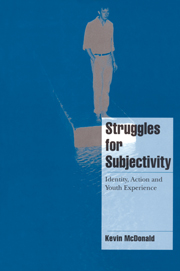Book contents
- Frontmatter
- Contents
- Acknowledgements
- Research participants
- 1 Introduction: subjectivity and social experience
- PART I The end of a working-class experience
- PART II Postmodern crisis: navigating the flow
- 7 None of the above: contemporary experiences of the gang
- 8 You'll be forgotten: visibility and mobility of graffiti writers
- 9 Between the body and the self: the anorexic terrain
- 10 We stand up for what we are: ethnicity and Aboriginality
- 11 Conclusion: struggles for subjectivity
- Bibliography
- Index
- Title in the series
9 - Between the body and the self: the anorexic terrain
Published online by Cambridge University Press: 05 December 2011
- Frontmatter
- Contents
- Acknowledgements
- Research participants
- 1 Introduction: subjectivity and social experience
- PART I The end of a working-class experience
- PART II Postmodern crisis: navigating the flow
- 7 None of the above: contemporary experiences of the gang
- 8 You'll be forgotten: visibility and mobility of graffiti writers
- 9 Between the body and the self: the anorexic terrain
- 10 We stand up for what we are: ethnicity and Aboriginality
- 11 Conclusion: struggles for subjectivity
- Bibliography
- Index
- Title in the series
Summary
In Chapters 2 to 8 we encounter situations that are clearly recognisable as social experiences: youth experiences in a poor suburb, gang experiences on the margins of consumer society, the graffiti writers' colonisation of non-places. All involve some struggle for recognition, an attempt to produce identity when confronted with social dilemmas and imperatives. But in this chapter we engage with a much smaller sample, only three young women, whose experience seems more personal than social: they have all experienced ‘eating disorders’. The term itself suggests malfunction of a necessary biological function. The experience at first appears to be solitary: in the case of anorexia, the women withdraw to the bedroom to sit by the heater when their bodies are no longer able to regulate their temperature; the women sit alone gorging chocolate biscuits when they suffer from bulimia. At first glance we are confronting individuals with disorders.
Research on the experience of eating disorders has been largely based on individual cases, using either clinical notes (Bruch 1978) or case studies of one or two individuals (Lee 1996) as the experience is intensely personal, seemingly almost self-absorption. This chapter also offers a small number of stories, but is based around dialogue. In what follows three young women – Beth, Renata and Andrea – strive to make sense of their experience. We encounter multiple themes, contradictory ways of making sense of the same experience.
- Type
- Chapter
- Information
- Struggles for SubjectivityIdentity, Action and Youth Experience, pp. 155 - 179Publisher: Cambridge University PressPrint publication year: 1999
- 1
- Cited by



